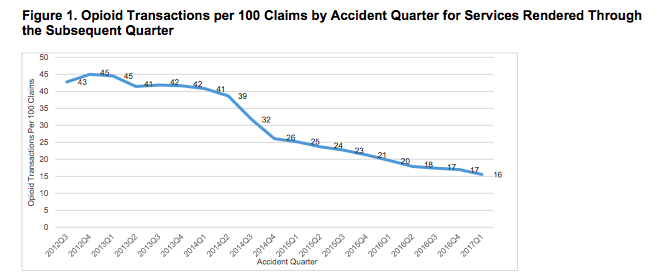Patients taking opioids over the long term don’t go back to work, yet many long-term opioid patients can be weaned off opioids within two years.
Those are the quick takeaways from two studies that came out last week.
First, a study from WCRI validates earlier research, finding:
- patients with multiple opioid scripts are out of work three times longer than patients with no opioid scripts, and
- patients who lived in places where providers prescribe a lot of long term opioids…are more likely to get opioids for longer periods than individuals who lived elsewhere.
This is the first study that looked at ALL lost-time claims with a diagnosis of low back pain in a very large area – 28 states that represent 80% of claims – over a five-year period. This is important because it shows cause-and-effect independent of so-called “severity” measures, which often use cost, treatment, or prescriptions to indicate medical severity, instead of actual clinical indicators. By looking at ALL low back claims with lost time, claims, it is clear that the driver of disability is long-term prescribing of opioids.
The takeaway is this – chronic use of opioids extends disability, and you can figure out where you need to focus your efforts by looking at publicly-available prescribing data.
California is one state with way too much experience in dealing with opioids in work comp; the graph below shows both the overuse, and the progress made in the Golden State since it got serious about reducing opioid usage.
source – WCIRB
Which brings us to the good news: weaning works, as research from California’s Workers’ Compensation Insurance Rating Bureau shows:
47% of the injured workers demonstrating chronic opioid usage weaned off of opioids completely within the 24-month Study period. Injured workers who did not wean off completely over the Study period still reduced opioid dosage by an average of 52%.
The research included all patients with more than 50 morphine equivalents over at least 3 months within 24 months of the date of injury.
Yes, it is difficult, expensive, requires a lot of assistance from trained professionals, and does not always work. All that said, given the finding that patients taking opioids for longer periods are out of work a lot longer, it is well worth the time and effort to help these patients reduce or end their use of opioids.




By weaning do they mean detox, or some type of program that actually deals with the addiction? Or is this the provider telling the patient you have to cut down to 4 tabs instead of 8 a day over a period of time. The problem with this type of weaning is that patients will experience withdrawal illness, which of course manifests itself in more back pain. Many of the providers I speak to really cannot handle this type of procedure, they do not have the time or the resources and a common approach is to tell us the the patient is functional and is not interested in cutting back or getting clean.
Tony – thanks for the question. The link leads to the report itself, which has more detail on the definitions used etc. This appears to be the key – Weaning was defined as the process of gradual reduction in opioid use after chronic
opioid status was achieved.
Also
No clear patterns of non-drug treatments (e.g., Physical Medicine) for weaning off of opioids were
evident, although the weaning process typically involved a gradual decrease in opioid prescribing
combined with a mix of alternative non-drug treatments and non-narcotic drugs.
Joe